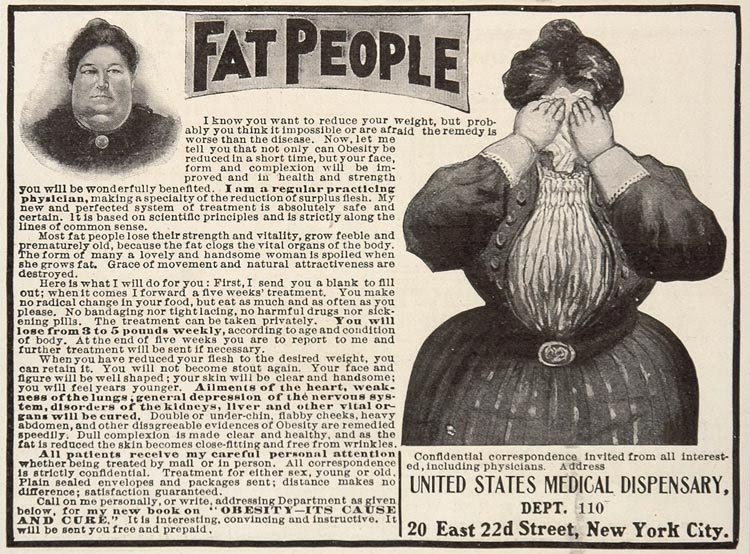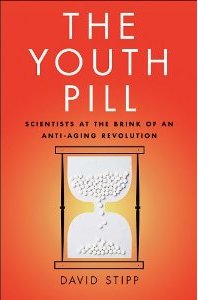July 18th, 2010 by Toni Brayer, M.D. in Better Health Network, Humor, Medical Art, Opinion, Quackery Exposed
No Comments »


I really want to know what the treatment is that this “regular practicing physician” sent to the patient to reduce the surplus flesh. “Eat as much and as often as you please” and “no bandaging nor tightlacing.” Bring it on!
*This blog post was originally published at EverythingHealth*
July 17th, 2010 by Edwin Leap, M.D. in Better Health Network, True Stories
No Comments »

Yesterday I had a university student shadowing me in the emergency department. AF is a bright student, a hard worker who will make a wonderful physician. She is always curious and insightful when I ask her questions, or show her new things. Today, she saw something that was new for her, but perhaps too common for me.
I walked into the room of an infirm, frail old gentleman who was gracious and polite, as was his family. It turns out he came to us with a terminal illness. I did not know it, but his physician was meeting him. So, as AF and I walked into the room, the patient’s physician walked in after us, and continued a conversation about hospice that he had apparently begun earlier in the day.
Realizing I had nothing to add, and would not be needed, I slipped away with my shadow behind. She looked at me, tears welling, and excused herself. Later she returned and explained that when she saw the wife’s wedding band, and knew what hospice meant, she could not restrain her tears. Read more »
*This blog post was originally published at edwinleap.com*
July 17th, 2010 by Harriet Hall, M.D. in Better Health Network, Book Reviews, News, Opinion, Research
No Comments »

 Wouldn’t it be great if we could find a way to prolong our lives and to keep us healthy right up to the end? Ponce de León never found that Fountain of Youth, but science is still looking. What are the chances science will succeed? How’s it doing so far?
Wouldn’t it be great if we could find a way to prolong our lives and to keep us healthy right up to the end? Ponce de León never found that Fountain of Youth, but science is still looking. What are the chances science will succeed? How’s it doing so far?
In his new book The Youth Pill: Scientists at the Brink of an Anti-Aging Revolution, David Stipp tries to answer those questions. From the title of the book, I expected hype about resveratrol or some other miracle pill, but instead it is a nuanced, levelheaded, entertaining, informative account of the history and current state of longevity research. It makes that research come alive by telling stories about the people involved, the failures and setbacks, and the agonizingly slow process of teasing out the truth with a series of experiments that often seem to contradict each other.
Anti-aging can mean several things. Extending the average lifespan is not the same as extending the maximum lifespan. Extending lifespan is not the same as preventing the degenerative changes characteristic of aging. Read more »
*This blog post was originally published at Science-Based Medicine*
July 16th, 2010 by DrWes in Better Health Network, Health Policy, Humor
No Comments »

From a discussion thread on Medscape (registration required) posted in response to comments on my earlier post entitled “If Lawyers Billed Like Doctors:”
Mr. Clark, it appears quite likely you are having a heart attack and will require my services. I will need a retainer of $1,500 via either cash or cashier’s check. This does not cover any treatment, but merely retains me as your physician.
Then you will need to deposit $5,000 into an escrow account. I will bill this account for services rendered. My charges are $400 an hour and I bill in 15-minute increments. Which means if it takes me 5 minutes to review your EKG, I still bill for 15 minutes.
When the escrow account reaches $1,000 you will need to deposit an additional $4,000 into the account or I will cease to be your physician and you forfeit the money in the escrow as well as the retainer, and if you continue to require my care you will need to retain me again.
Would you like me to treat your heart attack?
Ouch.
-WesMusings of a cardiologist and cardiac electrophysiologist.
*This blog post was originally published at Dr. Wes*
July 15th, 2010 by David H. Gorski, M.D., Ph.D. in Better Health Network, Health Policy, News, Opinion, Quackery Exposed, Research, True Stories
1 Comment »

There’s been a bit of buzz in the health blogs over President Obama’s decision last week to use the mechanism of a recess appointment to be the director of the Centers for Medicare and Medicaid Services (CMS).
Recess appointments, for those who may not be aware, allow a President to put a nominee in place when Congress is in recess in order to have him in place without the messy process of having him approved by the Senate. True, the Senate still has to approve a recess appointment by the end of its term, or the seat goes vacant again, but it’s an excellent way to avoid having nasty confirmation fights during election years. Of course, both parties do it, and the reaction of pundits, bloggers, and politicians tend to fall strictly along partisan lines.
If you support the President, then a recess appointment is a way to get around the obstructionism of the other party. If you don’t support the President, it’s a horrific abuse of Presidential power. And so it goes. Either way, I don’t really care much about the politics of how such officials are appointed so much as who is being appointed.
The man who was appointed last week to head CMS is Donald Berwick, M.D., CEO of the Institute for Healthcare Improvement. His being placed in charge of CMS will likely have profound consequences not just for how the recent health care/insurance reform law is implemented, but for how the government applies science-based medicine to the administration of the this massive bill. Read more »
*This blog post was originally published at Science-Based Medicine*






 Wouldn’t it be great if we could find a way to prolong our lives and to keep us healthy right up to the end? Ponce de León never found that Fountain of Youth, but science is still looking. What are the chances science will succeed? How’s it doing so far?
Wouldn’t it be great if we could find a way to prolong our lives and to keep us healthy right up to the end? Ponce de León never found that Fountain of Youth, but science is still looking. What are the chances science will succeed? How’s it doing so far?








